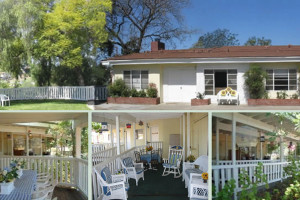Caring for someone with Alzheimer’s disease or another form of dementia is challenging. It is typically a fine line between caring from them on our own or locating a San Diego Memory Care Facility. It can be difficult to keep them calm and safe, and it can be exhausting to have to provide the level of help they need. It can also be upsetting to realize that they are not the same person you once knew – not the same the spouse or the parent you have shared your life with.
However, this does not mean that you cannot enjoy your time together, or that their life need be unfulfilled. There are some strategies you can use to provide proper treatment to the dementia patient you love, with dignity and respect.
Try Not to Parent
Because you may have to provide extensive help with activities like bathing, eating, and dressing, it can be hard to remember that you are not caring for a child. Try to avoid the tone of voice and expressions you would use if you were talking to a child. You may have to encourage your loved one to eat, or help them put on their socks, just as you would with a toddler, but use the tone of voice and language you would use with an adult. Don’t be condescending.
Don’t Scold
It can be very frustrating to care for someone with memory issues, and it may be difficult to have to repeat the same thing over and over. Try to maintain your patience, and remember that the patient is doing the best they can. The disease is what is frustrating you, not your loved one, but it can sometimes be difficult to remember that.
Anyone who has ever cared for someone with memory issues has found themselves saying something like, “Don’t you remember?” or “I just told you that!” Compounding the frustration is the guilt you feel because you know it’s not your loved one’s fault. Try not to scold, but forgive yourself if you do.
Help Fill in the Missing Information
People with Alzheimer’s and other forms of dementia will often search for a word that doesn’t seem to come to them. While you don’t want to finish every sentence, a prompt from you may help, particularly if the person is talking to someone else they don’t see often.
Rather than asking a question outright, give the patient a little bit of help. Instead of saying, “When was the last time Mary came to see you?” you might say, “I heard your daughter Mary was here last week. Did you have a nice visit?” The patient may remember the last visit, but not the time period. By asking this leading question, you can get them talking about the visit without pressuring them to remember when it was.
A Little White Lie isn’t Always a Bad Thing
There may be times when you have to bend the truth in order to keep your loved one safe. Many people with Alzheimer’s disease think they can still do things that they can’t, like going for a walk unassisted, using household appliances, or even driving. If you find your loved one trying to figure out how to use the washing machine, it’s okay to tell them that you’ve already done all the laundry, even if it’s piling up in the laundry room.
It may also be possible to phrase your answer to a question in such a way that you’re telling some of the truth but not all of it. For example, if your 90-year-old mother asks you if you’ve seen her father lately, you don’t need to tell her that he’s been dead for 40 years if you think it will upset her. You can simply say, “No, I haven’t seen him in a long while.”
Use the Distractor Factor
Those with Alzheimer’s and other forms of dementia may become fixated on a single subject or request, and may get upset if they feel they are not being heard. In this case, it doesn’t pay to get involved in the circular reasoning that may be a symptom of the disease. It’s often best to answer the question in a straightforward way, and then immediately change the subject to something else. For example. If your spouse is insisting on going to the beach even though it is raining, you can say, “No, we cannot go to the beach today, it’s raining. Now, what would you like for lunch? We can have soup or a sandwich.”
Try to Get Out
The weather in San Diego is so beautiful that people are used to going outside whenever they want. If you’re caring for someone with Alzheimer’s, outings can be challenging, and you may find yourself staying home much more. This can be isolating for both you and the patient, so it may help to go on an outing when you can. Some advance planning can help.
Take note of the time of day when the patient is most calm and cooperative. This is often in the morning, since confusion and anxiety may occur later in the day, which can lead to behavioral issues known as ‘sundowning.’ Plan your outing accordingly.
Try to go to a familiar place. It may stir some memories that have been dormant, which can lead to more conversation and more enjoyment of the outing.
Have a plan B. Try not to go too far from home, and have a way to make a graceful exit if it doesn’t go well. Places where you have to sit quietly for any length of time may not be the best choice, but an outdoor excursion where you can leave any time you want may be ideal.
Seek Help When You Need It | Time To Contact a San Diego Memory Facility?
Alzheimer’s disease is degenerative, and your loved one will continue to decline. There will likely come a time when they need to go into assisted living. It’s important to recognize that this day may come, and to be prepared for it so that you’re not forced into an emergency situation. Look for assisted living facilities near your home so you’ll know whom to call when the time comes.
Fortunately, Lakeside Manor is a premier San Diego Memory Care Facility. We are a renowned San Diego Dementia Assisted Living facility and we are available to help you and your loved one. Contact us for more information and schedule a tour of our charming and very welcoming facility located in Lakeside, CA.





